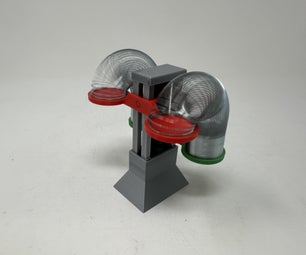Introduction: Truchet Cube
A cardboard cube which features a continuous Truchet Tile pattern on each of it's facets.
Attachments
Supplies
Software: Rhinoceros 7, Grasshopper, Adobe Illustrator. Hardware: CNC Later Cutter. Materials: Cardboard, Wood.
Step 1: Generating Truchet Pattern
This project was inspired by the popular Truchet Tile pattern, which is commonly generated by referencing a grid and connecting the midpoints of each square in the grid with two curves with a boolean algorithm which selects randomly for two possible orientations of midpoint connection. The grid was then dropped in resolution to 3 x 2, and baked as a polyline which would serve to cut the pattern into six panels for each side of the cube. Some of the cells were resized to compensate for the thickness of the cardboard when assembling with glued basic butt joints.
Step 2: 3D Modeling of Cube
The cube was then 3D modeled for error testing then reference when assembling.
Step 3: Cutting
The file was prepared to interface with the CNC Laser Cutter using Adobe Illustrator. After calibration, the CNC Laser Cutter automatically cut the pattern into the cardboard, before slicing the panels.
Step 4: Assembly
The pieces of the pattern were carefully removed from the bed of the laser cutter, and organized by which panel each belonged to. Referencing the model, the pieces were assembled with hot glue and toothpicks for joinery and stability.














